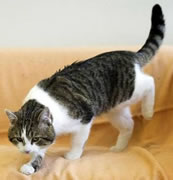
Today I came across the German word Mäusefänger (mouse catcher) in an article, sent to me by a friend, about the cat that recently took up the position of chief mouse catcher at 10 Downing Street, the official residence of British Prime Minister David Cameron. Number 10 apparently has a bit of a problem with mice, and there’s a long tradition of keeping cats at the prime minister’s residence and the treasury.
Mäusefänger is made up of two words: mäuse, the plural of maus (mouse), and fänger (catcher, fielder, interceptor, trap). Maus, which is of course related to the English word mouse, comes from the Proto-Germanic. *mus (a small rodent), from PIE *muHs- (mouse) [source]. The word muscle comes from the same root, via the Latin musculus (muscle, lit. “little mouse”), as does mussel, via the Old English muscle/musscel, and the Late Latin muscula [source].
While looking up some of the words in the article, I came across a useful German dictionary, canoonet, which not only gives information about German words (in German), and links to dictionaries for other languages, but also has grammatical information, such as noun and verb conjugations. There is also a Morphologie-Browser, which shows the words derived from a particular word – here’s an example with the word sehen (to see).
I also saw other German variations of ‘mouser’ Mäusejäger and ‘mäusejägende Katze’.
Welsh has ‘llygotwr’ for mouser from ‘llygota’ (to mouse/to catch mice) which ultimately derives from ‘llygoden’ (mouse) and similarly mirroring the allusion to muscles ‘llygoden y coes’ (mouse of the calf) is an old term for the calf muscle.
Oops forgot the mutation (camdreiglo!) should be ‘llygoden y goes’.
Never realized “mouser” was a word!
Dreaminjosh – I wouldn’t say mouser or the verb ‘to mouse’ are particularly common words and ‘mouser’ would normally be qualified with ‘good/bad’ eg. That cat’s a good mouser.
When I was looking up the word ‘mouse’ in the English side of a German dictionary it listed a related term of ‘mouse cheese’? The German translation was ‘gewöhnlicher Käse’ which in English would be ‘ordinary cheese’? I’ve never heard of ‘mouse cheese’ used in (UK) English, initially I thought it was some humorous term for Swiss cheese because of its characteristic holes.
In the US, there’s the rare term “rat cheese”. The only people I’ve ever heard use it were my mother and aunt, who would use it to refer to cheddar from the local grocery store. Here’s an official definition.
Petréa – Ta for that dictionary definition of ‘rat cheese’ which sounds even more unpalatable than this mysterious mouse variety?! I see what it’s implying though namely inexpensive, bog-standard cheese that’s really only fit for rodents to eat.
Yenlit: in British English “mousetrap” (short for “mousetrap cheese”) is the term used for middling-to-poor quality cheese, i.e. the kind of cheese that is not particularly good in itself but perfectly adequate for attracting mice to mousetraps! This is the more usual term for your “mouse cheese” finding.
Kevin – Thanks for the clarification and now I come to think of it the entry in the dictionary listed what I initially assumed was ‘mouse cheese’ as ‘m. cheese’. I suppose the ‘m.’ really stands for mousetrap then? Even so, I’ve never heard the phrase before and I speak English and buy cheese!
I wonder if “fänger” is a cognate of English “fang”?